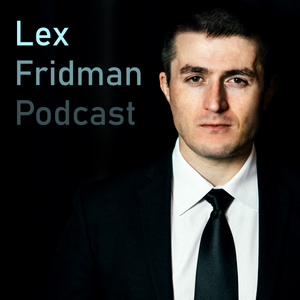
Psychology of Taste: Unpacking the Senses with Prof. Charles Spence
02/11/25 • 50 min
In this week's episode, we talked to Professor Charles Spence, head of the Crossmodal Research Laboratory at the University of Oxford. Known for his innovative research on how our senses interact to shape our experiences, Professor Spence shares fascinating insights into the psychology of taste and smell.
Join us as we explore the implications of this research for food design, the ethics of sensory manipulation, and the future of dining experiences. From the impact of cutlery weight to the role of sensory overload in our modern lives, this episode is a rich tapestry of science, curiosity, and culinary delight.
USEFUL LINKS:
The Crossmodal Research Laboratory at the University of Oxford - https://www.futureoffood.ox.ac.uk/article/crossmodal-research-laboratory
More about Prof. Charles Spence - https://www.psy.ox.ac.uk/people/charles-spence
Gastrophysics: The New Science of Eating by Charles Spence - https://www.goodreads.com/book/show/32970441-gastrophysics
Senshacking by Charles Spence - https://www.goodreads.com/book/show/42184219-sensehacking
In this week's episode, we talked to Professor Charles Spence, head of the Crossmodal Research Laboratory at the University of Oxford. Known for his innovative research on how our senses interact to shape our experiences, Professor Spence shares fascinating insights into the psychology of taste and smell.
Join us as we explore the implications of this research for food design, the ethics of sensory manipulation, and the future of dining experiences. From the impact of cutlery weight to the role of sensory overload in our modern lives, this episode is a rich tapestry of science, curiosity, and culinary delight.
USEFUL LINKS:
The Crossmodal Research Laboratory at the University of Oxford - https://www.futureoffood.ox.ac.uk/article/crossmodal-research-laboratory
More about Prof. Charles Spence - https://www.psy.ox.ac.uk/people/charles-spence
Gastrophysics: The New Science of Eating by Charles Spence - https://www.goodreads.com/book/show/32970441-gastrophysics
Senshacking by Charles Spence - https://www.goodreads.com/book/show/42184219-sensehacking
Previous Episode

Hair, Health and Pollutants with Prof. Brice Appenzeller
And what if we looked closer at our hair?
In our latest episode, our guest is Prof. Brice Appenzeller, head of the Human Biomonitoring Research Unit at the Luxembourg Institute of Health. After reminding our listeners what exposome is, Brice elaborates on the various agents we may be exposed to, including physical, microbiological, and chemical pollutants. He emphasizes that while we often hear about individual pollutants, the reality is that we are exposed to a complex mixture of chemicals on a daily basis. This multifaceted exposure can significantly impact our health, making it crucial for us to understand and monitor these interactions.
One of the key methods Brice discusses is biomonitoring, which involves analyzing biological samples—such as urine, blood, and hair—to detect the presence of chemicals or their by-products. Hair samples, in particular, offer a fascinating insight into long-term exposure and can reveal compounds that may not be detectable in other types of samples. And this is Brice's specialisation.
USEFUL LINKS
Brice Appenzeller on LIH Website - https://researchportal.lih.lu/en/persons/brice-appenzeller/projects/
Society of Hair Testing - https://www.soht.org/
RELATED EPISODES:
Interview with Prof. Emma Schymanski: https://www.scilux.eu/episodes/unknown-chemicals
Interview with Dr. Dagny Aurich: https://www.scilux.eu/episodes/exposomics
Interview with Dr. Guy Fagherazzi: https://www.scilux.eu/episodes/colive-voice
The episode cover is designed using a graphic downloaded from vecteezy.com
Next Episode

Lunar Regolith or Dust and Rocks on the Moon with Timon Schild
In the third episode of this month, we re-explore the world of lunar resource utilization with Timon Schild, a PhD student at the European Space Resources Innovation Center (ESRIC). Join us as Timon unpacks the concept of In Situ Resource Utilization (ISRU) and its implications for future lunar missions.
Timon shares insights on lunar regolith—what it is, how it forms, and the unique challenges it presents for exploration and extraction. We also discuss cutting-edge technologies like molten salt electrolysis that could enable us to extract oxygen and metals directly from lunar material.
USEFUL LINKS
ESRIC - https://www.esric.lu/
Space Resources Week 2025 - https://www.spaceresourcesweek.lu/
More about Timon Schild - https://www.list.lu/en/news/spotlight-on-phd-student-timon-schild-eyes-on-the-moon-and-feet-on-the-ground/?no_cache=1&cHash=1eeb39a62b3a2d51ccc7f97d41a753ab
Take-Off Show Episode about Space - https://youtu.be/O5keQCzCJ8w?si=QA-E69iZcrT_LrXN
If you like this episode you’ll love
Episode Comments
Featured in these lists
Generate a badge
Get a badge for your website that links back to this episode
<a href="https://goodpods.com/podcasts/scilux-227614/psychology-of-taste-unpacking-the-senses-with-prof-charles-spence-83980736"> <img src="https://storage.googleapis.com/goodpods-images-bucket/badges/generic-badge-1.svg" alt="listen to psychology of taste: unpacking the senses with prof. charles spence on goodpods" style="width: 225px" /> </a>
Copy





